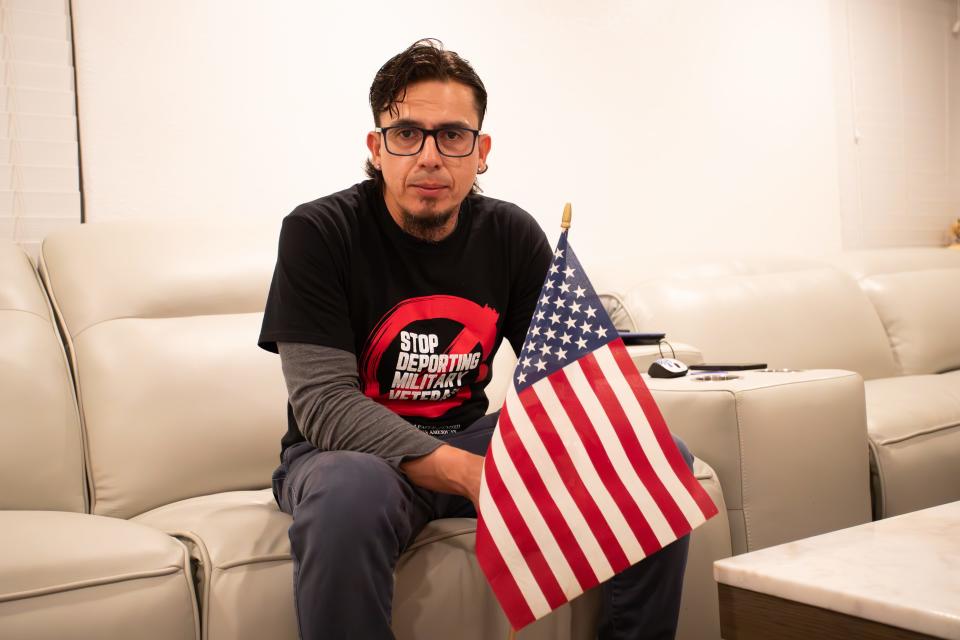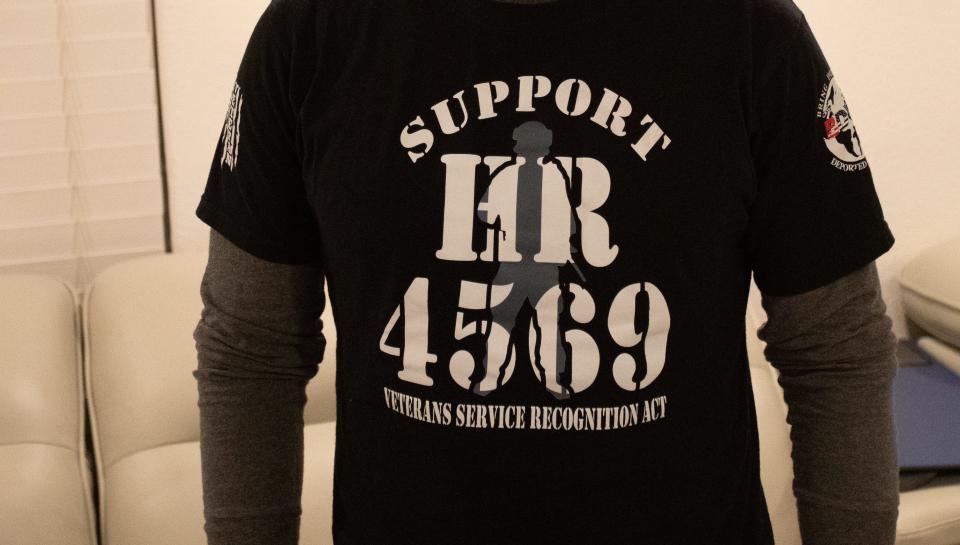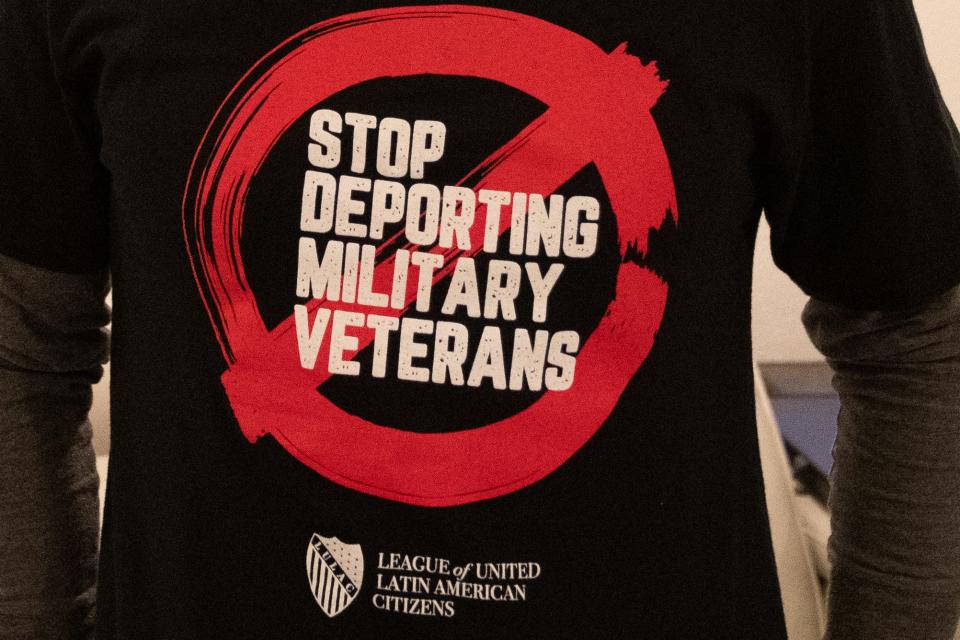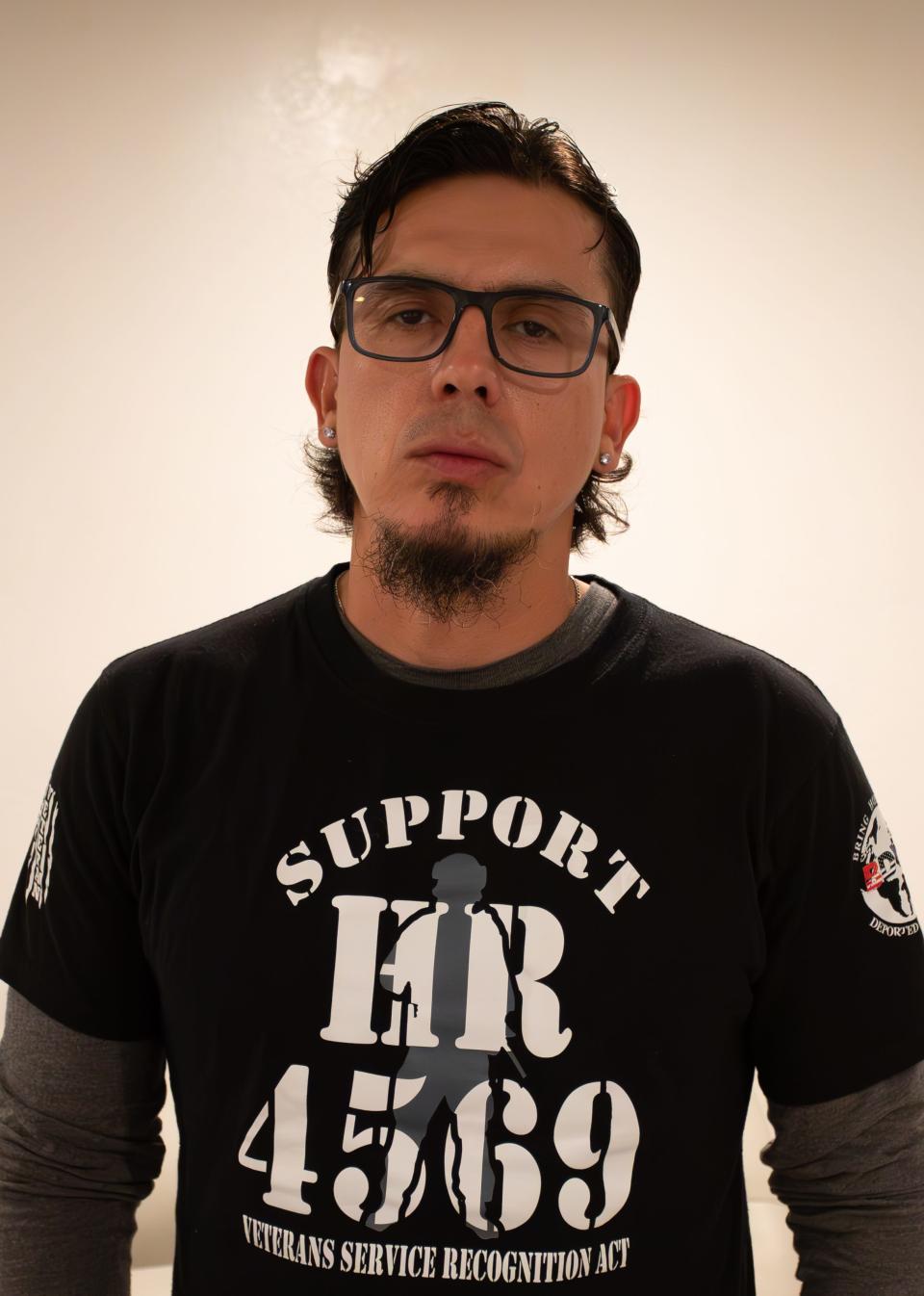'This is not an immigration issue': Once deported, this veteran is fighting to bring others home
In 1998, Phoenix resident Alejandro Murillo enlisted in the United States Navy when he was in his 20s, becoming a jet mechanic during the Iraq war.
He proudly wore his uniform for four years defending the country he calls home.
That pride was short-lived after his permanent resident status was revoked following a marijuana possession conviction in California. Murillo was deported to the border city of Tijuana, Baja California, Mexico, on Dec. 20, 2011.
“At first I felt anger, anguish. I didn't understand why the country that I loved so much was expelling me to Mexico, a country that I didn't know,” Murillo told The Arizona Republic.

It took over a decade for him to step on U.S. soil again with the help of a humanitarian visa.
Murillo's story mirrors that of countless deported veterans whose years of military service fell short of granting them legal stay in the country they fought for.
Now 46 and back in Phoenix, Murillo has been hard at work, joining a yearslong nationwide fight to bring back deported veterans like him.
How many veterans have been deported?
Data on how many veterans have been placed in deportation proceedings or how many have been deported is not made available by U.S. immigration authorities, but activists working in U.S.-Mexico border towns like Tijuana, Ciudad Juárez, Chihuahua, and Nogales, Sonora, are in contact with a network of hundreds.

Robert Vivar Landeros is the founder and director of the Unified U.S. Deported Veterans Resource Center, an organization that provides help to veterans who have been deported to Mexico and other countries. According to Vivar, he is in contact with at least 500 deportees around the world who have served in the U.S. military.
“Surely there are more, there may be thousands, but there is no official figure ... that is only what we know,” he said.
Non-citizens can serve in the military but must have permanent residence status. Upon enlisting, they are then eligible to apply and become naturalized citizens.
According to the U.S. Citizenship and Immigration Services, about 5,000 permanent residents enlist in the military each year. A USCIS report shows that between 2019 and 2023, more than 40,000 service members have become naturalized citizens.

While enlisting in the military provides eligibility to become naturalized citizens, the process is not automatic and for many who have been convicted of crimes and have served jail time, not having been born on U.S. soil overshadows those years of service.
Veterans struggling with substance abuse as a result of post-traumatic stress developed from their time in the military play a key role in those deportation proceedings, Vivar said.
“(The U.S. government) promises that they will help you with your immigration situation, but once you finish your service and you make the slightest mistake that causes you a legal problem, then they start a deportation process,” said Vivar.
'This is not an immigration issue'
Although Vivar is not a war veteran, he began his activism in this space because of family members who have served and are active servicemembers of several U.S. military branches.
“My son just retired from the Air Force after 23 years. I have a grandson who is still in the Navy. I have a brother who was a veteran of the Vietnam War and my partner's son is a veteran of the Iraq War,” Vivar said.

In Tijuana, he founded the Unified U.S. Deported Veterans Resource Center, an organization that provides resources to deported veterans and helps with immigration proceedings.
“Whether in person at the office, via email or WhatsApp, we have helped about 50 veterans in total,” said Vivar, who was one of the main facilitators who helped Murillo legally return to Phoenix.
Still, a nonprofit organization can only do so much. At the federal level, legislators are looking to address these immigration issues through the Veterans Service Recognition Act, introduced earlier this year by Rep. Mark Takano, D-Calif.
HR 4569 addresses immigration-related issues affecting non-citizen military veterans by authorizing the Department of Homeland Security to grant citizenship status to a veteran who is subject to deportation.
If a veteran is not a United States citizen but is eligible to become a citizen, that person must be given a reasonable opportunity to apply for such status and may not be removed until there is a final administrative decision on the veteran's eligibility, according to the bill's language.
The bill also extends certain deadlines related to obtaining citizenship after serving.
“Ideally, they should receive all the necessary support so that when they finish their basic training, they also finish the citizenship process, so they graduate from their training and at the same time graduate as citizens of the United States," Vivar said.
Both Vivar and Murillo were part of a delegation of 60 people that traveled to Washington, D.C., in October to bring awareness to veterans trapped in legal limbo outside of the United States.
According to Vivar, dozens of meetings were held with Republicans and Democrats alike and with Congress and Biden Administration members, all to pressure them into passing the Veterans Service Recognition Act.
“The response from Democrats was very productive, but our primary target was conservative politicians, as there are only two Republicans who openly support the legislation... This is not an immigration issue, it is a veterans issue. If they say they support the armed forces there should be no problem for them to support this legislation," Vivar said.
Eleven years to get back home
After being deported, Murillo settled in Rosarito, Baja California, a city 12 miles south of the Tijuana-San Diego border, and began a tireless fight to return to Phoenix, the city he was raised in and where he had family and children who were waiting for him.
He joined the efforts of the Unified U.S. Deported Veterans Resource Center, where his advocacy for deported veterans like him has only grown.
After 11 years, Murillo is now back in Phoenix with his family and working as a technician.
His hope is that others in Mexico and other parts of the world can return home.
“It was in April 2022 when they gave me the news and I still remember it very well,” said Murillo. “I felt a lot of emotion, joy, happiness, but at the same time sadness for all the fellow deported veterans who have not yet been able to feel this I am feeling."
Reach La Voz reporter Javier Arce at javier.arce@lavozarizona.com and follow him on X, formerly Twitter, @javierarce33.
This article originally appeared on Arizona Republic: Phoenix veteran helps push Congress to bring deported veterans home

